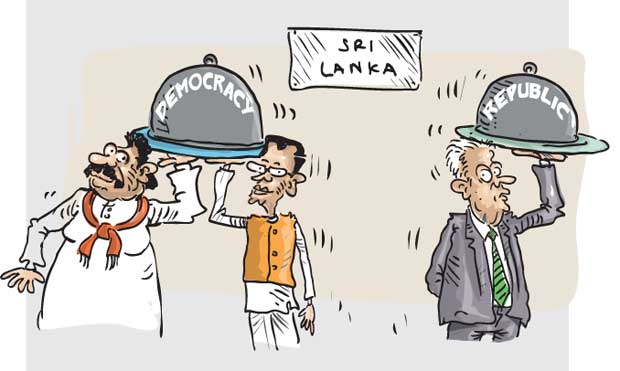05 Mar 2018 - {{hitsCtrl.values.hits}}

The best argument against democracy, is a five-minute conversation with the average voter – Winston Churchill Democracy is said to be a form of government where people elect their own government based on the majority vote. The political minority, be it social, ethnic or religious has a relatively limited say in a Democracy. Republic is a system which addresses this inadequacy. It has either a charter or a constitution that safeguards the minority from being under-represented or eclipsed by the majority. However a Republic too is a democracy with elected representatives just like a Democracy. The two are therefore not mutually exclusive.
Sri Lanka, just like most of the countries in the world today, is a Democratic Republic, a Democracy with certain features of a Republic, especially with Chapter 3 of the Constitution dedicated to fundamental rights.
While the post February 10 political crisis in Sri Lanka is being interpreted in manifold ways by analysts, one may say that at the end of the day it boils down to nothing but a battle between those who stand up for the two features - Democratic and Republic features of the Constitution.
With their strong Sinhala Buddhist backgrounds, Mahinda Rajapaksa and President Maithripala Sirisena represent the democratic or rather the majoritarian feature of the Constitution while the urban, minority friendly Prime Minister Ranil Wickremesinghe stand up for the republic features.
Just as he did in 2001, the UNP leader since his election in 2015 too attempted appeasements for the minorities risking his own political survival as the prime minister. The result, while his 2001 December government lasted two years and four months this time too after two and-a-half years after August 2015 election,his mandate is once again challenged.What the UNP leader perhaps fails to understand is that every time he attempted to strengthen the Republic features of the Constitution it went on to create a fear psychosis among the majority Sinhala Buddhists. Their degree of insecurity was such they were ready to bring back even the once rejected leader largely because he was seen as a guardian of the majoritarian features of the Constitution. All his other sins were forgiven and forgotten. Even if Mahinda Rajapaksa did not field candidates under his Pohottuwa symbol at February 10 polls the bulk of the vote that went his way would have gone to the more Sinhala – Buddhist Maithripala Sirisena instead of the UNP.
Such was the degree of the insecurity of the majority community created by the UNP with a slew of acts which were seen by the majority as anti-Sinhala Buddhist. Key among them was the tampering of Article 9 of the Constitution. Interestingly amendments to Article 9 had never been among the key demands of the Tamil or Muslim political parties. Despite this, following the August, 2015 election victory the UNP ventured to start its tinkering of the Constitution with article 9 – the most sensitive one to the majority Buddhists. In fact while corruption in the form of bond manipulation spoilt the UNP reputation and turned away the informed voter from the party, it was measures like it’s tampering with the Article 9 of the Constitution that set the overwhelming majority of Buddhists against the ruling UNP.The UNP however as usual was blissfully ignorant of this build-up of disillusionment among the masses.
Winston Churchill once famously said that the best argument against democracy is a five minute conversation with the average voter.The failure of the UNP leaders to have that five minute conversation with the average voter, and their closeting in with the jet-setting busybodies from Colombo think tanks and NGOs instead, has not only threatened the survival of the government but also put the country in a major fix today. With Pohottuwa of Mahinda Rajapaksa, who was defeated by people just three years ago, now owning the latest mandate while the President and Prime Minister holding on to their 2015 mandates, what the country is witnessing today is nothing less than a right royal pickle of democracy. While political leaders of all parties have now become prisoners of the Constitution, the voters question the relevance of elections as their latest mandate seems to hold very little political significance.
28 Oct 2024 3 hours ago
28 Oct 2024 3 hours ago
28 Oct 2024 5 hours ago
28 Oct 2024 7 hours ago
28 Oct 2024 7 hours ago